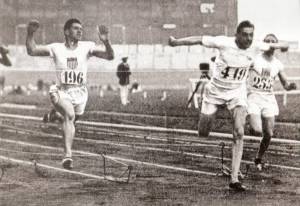
Harold Abrahams winning the 100M in 1924
I was only a boy when Chariots of Fire first hit the silver screen. I remember watching it with my parents— This is long before Internet streaming or NetFlix or DVDs, and video-tape machines were even still pretty expensive, and films were not released for home viewing as they usually are today. So imagine how impressed I was when I recently streamed it via Netflix and remembered so many of the significant scenes and lines.
This classic film tells the story of two Olympic runners, one a Jew, Harold Abrahams, the other a Christian, Eric Liddell. In the story, Liddell is the one who puts God first. A missionary to China, he refuses to run on Sunday, the Christian Sabbath, because the Sabbath is sanctified. And that did happen in real life, though not quite as dramatically as portrayed in the movie. He also finds importance in his running, even though he doesn’t see it as his ultimate calling: “I believe God made me for a purpose, but he also made me fast. And when I run I feel His pleasure.” This is one of the most memorable statements that the writers put into Eric Liddell’s mouth, and for good reason, as it turns the tables on what Christians usually think of as the work of God. We understand that preaching in China is God’s work, but how can God use an activity so mortal as running?
As a teen, I wrestled with this issue, but I didn’t get it. I loved developing software, but I didn’t see how God could use me in that occupation. Maybe if I wrote a computer program that helped introduce people to the idea of salvation… because I believed the most important things in life were about spiritual salvation, and the way to bring God’s purpose into your life was to orient it in that direction.
Harold Abrahams, meanwhile, drives himself to win, by any means possible within the rules. He values his Jewish identity, but we never see him wear a kippah. We never see him in shul. In fact, he uses an awful lot of words of dialogue just trying to fit in as an Englishman, because loathsome attitudes against Jews is an emotional burden against which he wrestles. While he never denies his Jewish heritage, he is the kind of Jew we today would call “secular.” Ultimately, Abrahams falls in love with a Christian girl. And that, too, did happen in real life, though not exactly as portrayed in the movie. In real life, he converted to Catholicism just as the Nazis were coming into power, and then he met Sybil Evers, who would become his wife.
So we have two stereotypes here. One is of the Christian who pursues God’s spiritual eternity, but sees God’s hand even in the mortal activities of life. The other is of the Jew who pursues success in this life, though with honesty and a steel-hard work ethic. The strength of these stereotypes are no doubt one of the reasons Chariots of Fire is so famous a film. But these stereotypes radically oversimplify the truth of the differences between Jews and Christians. It’s a truth I believe both sides can benefit from, but I want to look at it from the Christian perspective. Continue reading “Running for God”









